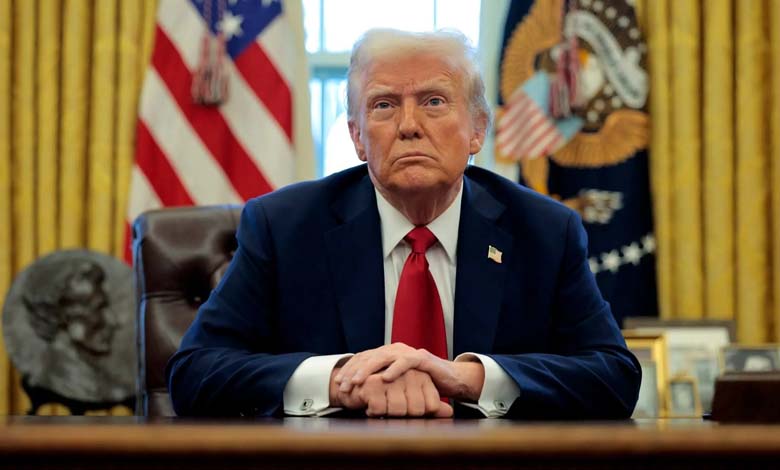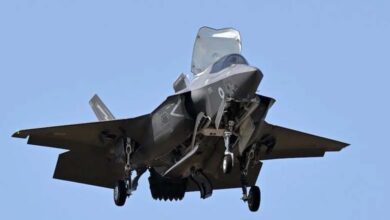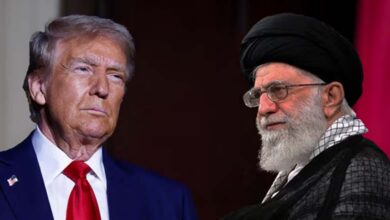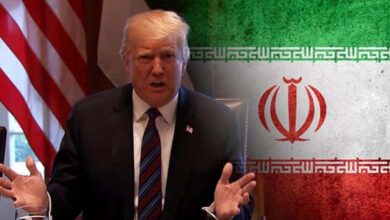Trump Announces Ceasefire Between Israel and Iran

Israeli Prime Minister Benjamin Netanyahu stated that Israel accepted U.S. President Donald Trump‘s ceasefire proposal with Iran after achieving its objective of neutralizing the Iranian nuclear and missile threat.
On Tuesday, President Trump announced that the ceasefire between Iran and Israel was now “in effect” following a period of intense mutual attacks that resulted in several casualties and heightened concerns about further escalation.
-
Intense Cyber War Between Israel and Iran
-
Washington Tests Military Capabilities Amid Escalation Between Israel and Iran
Posting on Truth Social, Trump wrote: “The ceasefire is now in effect. Please, do not violate it!” Earlier, he had announced that both Iran and Israel had agreed to a gradual ceasefire to begin around 4 a.m. GMT on Tuesday. Iran would halt its operations first, followed by Israel twelve hours later.
Netanyahu confirmed in a statement released by his office that Israel had agreed to the U.S. proposal after accomplishing its mission of removing the Iranian threat.
However, an Iranian official denied that a ceasefire agreement had been reached. Iran’s semi-official Fars news agency quoted the unnamed official as saying that Tehran had not received any formal or informal offer for a ceasefire.
-
Israel strikes Hamas, Hezbollah, and Houthi “weapons supply line” in Iran… Who is Behnam Shahriari?
-
Mutual escalation between Iran and Israel despite calls for de-escalation
He described Trump’s proposed plan as “completely false,” claiming it was intended to divert public attention from recent attacks on U.S. bases and the “humiliation” suffered by the U.S. military.
Earlier, Iranian Deputy Foreign Minister Abbas Araghchi tweeted on X that “so far, there is no ceasefire or agreement to halt military operations. However, if the Israeli regime ends its illegal aggression against the Iranian people by 4 a.m. Tehran time at the latest, we will not continue our response after that time.”
He added, “Iran has reiterated time and again that it was Israel—not Iran—that started the war,” noting that Iran’s final decision regarding halting military operations would come later.
-
One Week into War: Iran Expands Its Strikes on Israel with the Largest Rocket Barrage in 48 Hours
-
Missiles, Casualties, and Damage: Israel Reveals the Toll of Iranian Attacks
On Monday, Trump announced that a “full and comprehensive” ceasefire between Iran and Israel would take effect to end the 12-day conflict, which caused mass displacement from Tehran and raised fears of broader regional escalation.
The Israeli military reported that missiles had been launched from Iran toward Israel in the early hours of Tuesday. It said defense systems were working to intercept the threat.
Israel, joined by the United States, had earlier carried out strikes on Iranian nuclear facilities, accusing Tehran of nearing nuclear weapons capability.
-
Hypersonic Missiles and Strikes on Nuclear Facilities: Day Six Between Iran and Israel
-
Iran-Israel Escalation: Mass Launch of Evacuation and Withdrawal Phases
Trump wrote on Truth Social: “Assuming all goes as planned—and it will—I want to congratulate both countries, Israel and Iran, for having the courage, wisdom, and capacity to end what should be known as the Twelve-Day War.”
A senior White House official said Israel agreed to the ceasefire on the condition that Iran would launch no further attacks. Trump brokered the deal in a phone call with Netanyahu.
Trump appeared to suggest that both sides would be allowed time to wrap up ongoing operations before the phased ceasefire commenced.
-
Anticipation and Preparations in Israel for a Double Attack from Iran and Yemen
-
Iran and Israel: Cross-Strikes… Is There Still a Window for Nuclear Negotiations?
Iran maintains it does not seek nuclear weapons, though Supreme Leader Ali Khamenei has declared, “If we wanted to, no global leader could stop us.”
Israel, not a signatory to the Nuclear Non-Proliferation Treaty, is believed to be the Middle East’s only nuclear-armed state—a fact it neither confirms nor denies.
A source familiar with the negotiations told Reuters that Qatari Prime Minister Sheikh Mohammed bin Abdulrahman Al Thani secured Iran’s approval during a phone call with Iranian officials. Trump later informed Qatar’s emir of Israel’s agreement to the ceasefire.
-
Israel’s Strikes on Iranian Nuclear Facilities: Conflicting Assessments and Unclear Outcomes
-
Israel and Iran: Everything You Need to Know About The Fire Saturday
A White House official said Vice President J.D. Vance, Secretary of State Marco Rubio, and special envoy Steve Witkoff had maintained direct and indirect contact with Iranian counterparts.
Earlier, three Israeli officials indicated that Israel was seeking to end its campaign against Iran and conveyed this message to the United States.
Israeli Channel 12 reported that Netanyahu instructed cabinet ministers to refrain from public comments.
Markets reacted positively to the news: S&P 500 futures rose by 0.4% late Monday, suggesting Wall Street would open higher on Tuesday.
-
Israel Vows Retaliation as Iran Issues Threats — Red Lines Crossed and Strikes to Continue
-
Israel Launches Massive Strike on Nuclear and Missile Facilities in Iran
U.S. crude futures dropped to a one-week low during early Asian trading on Tuesday, as the ceasefire announcement eased concerns over supply disruptions.
Yet calm has not fully returned to the region.
The Israeli military issued two evacuation warnings to residents in Tehran within two hours—one late Monday and another early Tuesday.
Israeli army radio also reported sirens being triggered in the southern Golan Heights over fears of hostile aircraft infiltration.
-
Is an Attack Imminent? US Newspaper Reveals Israeli and Iranian Preparations
-
In Iran’s Eid Sermon: The U.S. and Israel Present with Warnings
According to Israeli media, four people were killed and twenty-two injured early Tuesday, following a barrage of 11 missiles launched by Iran over two hours in five separate waves targeting various parts of Israel.
Channel 12 reported the death of four Israelis and injuries to twenty-two others, including two in moderate condition and twenty with minor injuries, after an Iranian missile struck a residential building in Beersheba.
The channel previously stated that one Israeli had been seriously wounded in the Iranian missile strike on Beersheba, noting “massive destruction” at the site of impact.
-
Following Approval from Iran and Israel: Ceasefire Negotiations in Lebanon Enter Final Stages
-
“Surprise” in Israeli Attack on Iran: Advance Warning of Date and Targets?
The same channel also reported that an Israeli woman was injured by debris from an interceptor missile in the north. Earlier, it had noted that a “fifth wave of Iranian missiles had been detected since early Tuesday.” Explosions were heard in central Israel, caused by the interception of Iranian missiles, according to the same source.
The channel added that two missiles were launched toward northern Israel but were intercepted by air defense systems, and one additional missile was detected heading toward the south.
Later, it reported that the Israeli government was currently deliberating how to respond to the deaths of four citizens in the Iranian missile strike on Beersheba.
-
No Ceasefire in Gaza until De-escalation between Iran and Israel
-
Details of Iran’s “Recruitment” of an Israeli and His Girlfriend to Carry Out an “Assassination” Operation
Following the attack, Israeli Defense Minister Yisrael Katz confirmed that he had ordered the army “to respond forcefully to Iran’s violation of the ceasefire,” after missiles were detected coming from the Islamic Republic toward Israel.
In a statement, he said: “I have instructed the Israeli army to strike hard in response to Iran’s breach of the ceasefire and to hit regime targets deep in Tehran.”
On Monday, Trump said he would encourage Israel to move forward toward peace after downplaying Iran’s missile attack on a U.S. airbase. The Iranian strike caused no casualties, and the American president thanked Tehran for providing advance notice before the attack.
-
In Case of an Israeli Attack: Source Discusses Iran’s Plan and Target Bank
-
Iranian Missiles on Israel: Launch and Interception Costs
He said Iran launched 14 missiles at the U.S. base, calling it a “very weak response, as we expected, and we handled it extremely well.”
Iran’s approach echoed its strategy in previous confrontations with the U.S. and Israel, attempting to strike a balance between saving face and military retaliation without triggering an escalation spiral. It appears Tehran succeeded in this aim.
The Iranian strike came after American bombers attacked underground Iranian nuclear facilities at the beginning of the week using 30,000-pound bunker-buster bombs, thus joining Israel’s air campaign launched 12 days earlier.
-
Can Hezbollah stand up to Israel? Iranian President expresses doubts
-
Iran’s Secret Document Ignites a Dispute within the Israeli Military and Netanyahu’s Office
Many of Tehran’s ten million residents fled the capital after days of continuous airstrikes.
The Trump administration emphasized that its objective was solely to destroy Iran’s nuclear program—not to ignite a broader war.
The U.S. Vice President told Fox News: “Iran was about to acquire a nuclear weapon… Now, with the equipment they have, they can no longer make one because we destroyed it.”
Trump also posted on social media Sunday about toppling the hardline religious rulers whom he described as the U.S.’s primary enemies in the Middle East since the 1979 Islamic Revolution.
Meanwhile, Israel made it clear that its strikes on Evin Prison—infamous for holding political prisoners—and other targets in Tehran were meant to weaken the regime and its ability to maintain control.












